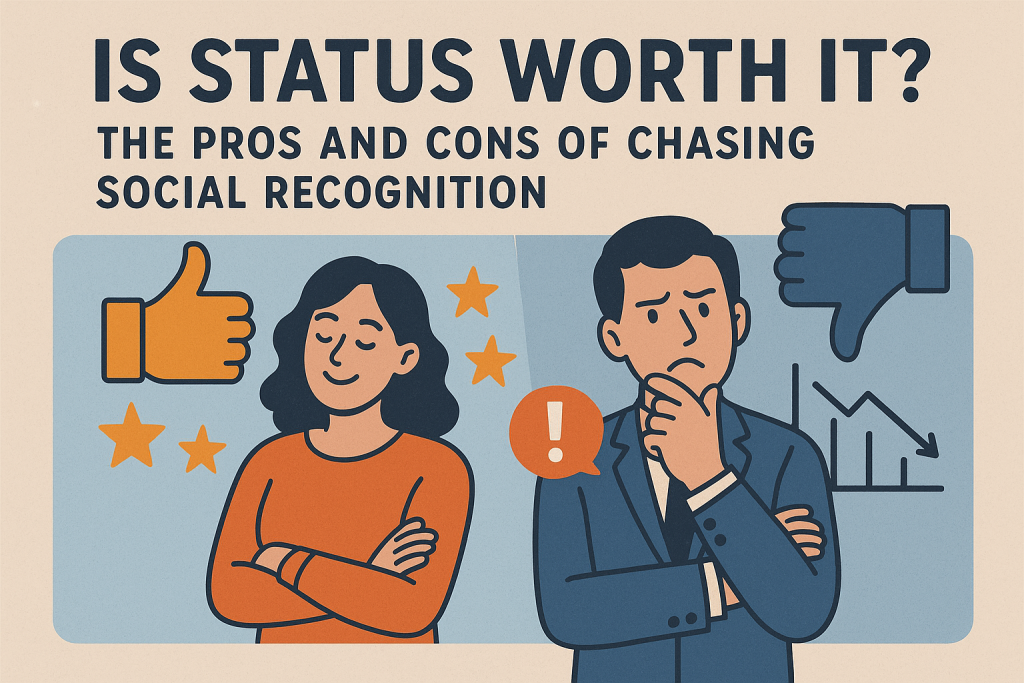In today’s society, status is often seen as the ultimate marker of success—but is status worth it? From corporate promotions to social media fame and luxury possessions, we’re constantly bombarded with the idea that being admired or recognized by others is the path to happiness. But does it really deliver long-term fulfillment, or can the pursuit of status actually harm our well-being?
In this blog post, we’ll dive deep into the pros and cons of status, examining how the desire for social recognition impacts our mental health, relationships, and overall well-being. Through real-life examples, studies, and practical insights, we’ll help you understand the complex nature of status, and whether it’s worth the pursuit.
The Pros of Status: Why People Chase Social Recognition
It’s clear that status plays a significant role in our society. While the pursuit of status can sometimes be overwhelming or misguided, there are several benefits to striving for social recognition, both for individuals and society as a whole.
1. Status Can Bring Financial and Professional Opportunities
One of the main reasons people pursue status is for the tangible rewards it can bring. From promotions and raises to speaking engagements and networking opportunities, higher social standing can often lead to increased financial rewards and career advancement.
Social Capital: High status brings access to networks and people who can help you professionally. The ability to connect with influential individuals is a powerful tool, one that can lead to collaborations, partnerships, and other career advancements. Studies have shown that networking with high-status individuals can increase your chances of success in a competitive job market.
Career Climbing: Think about the corporate world. Those who attain higher positions often gain access to better resources, larger teams, and more significant decision-making authority. For many, status is synonymous with career success.
Study: A study published in the American Sociological Review found that people in higher social positions tend to have better job prospects, earn more money, and are more likely to be promoted than their lower-status counterparts.
2. Status Brings Social Influence and Power
With greater social standing often comes increased power and influence. People with status have the ability to sway opinions, influence trends, and even shape societal norms. This social power can be highly rewarding for those who enjoy leadership roles or want to create meaningful change.
Influencing Others: High-status individuals often hold significant influence over others. For instance, political leaders, celebrities, and entrepreneurs use their status to advocate for causes, promote products, and set trends.
Social Impact: High-status people are often seen as experts in their fields and are in positions to lead movements or make decisions that impact society. Whether through charitable work or public speaking, status allows individuals to shape public discourse.
Example: Bill Gates, for example, has used his high status to advocate for public health initiatives and philanthropy through the Bill & Melinda Gates Foundation. His ability to mobilize resources and influence world leaders is largely a result of his status as a successful entrepreneur and philanthropist.
3. Status Provides a Sense of Identity and Validation
Another benefit of status is the sense of validation and self-worth it can provide. For many, gaining status confirms their value in the eyes of others, which can boost confidence and encourage personal growth.
Recognition and Acceptance: When we are recognized and admired, it validates our hard work and efforts. This is especially true in a society that often ties success to external achievements.
Pride and Belonging: Status can foster a sense of belonging to a specific group, whether it’s an elite professional network or a social circle. This connection is important for personal growth and community building.
The Cons of Status: Is the Pursuit of Social Recognition Worth the Cost?
While the benefits of status are undeniable, there are also significant drawbacks to the constant pursuit of social recognition. The desire for status can sometimes be unhealthy, leading to stress, dissatisfaction, and even social isolation.
1. The Pressure to Constantly Perform
One of the biggest downsides to seeking high status is the pressure to always perform at a high level. For individuals in leadership positions, there is often an expectation to constantly succeed and outdo competitors. This constant need to prove oneself can be exhausting and lead to burnout.
Perfectionism: People who pursue status often feel the need to be perfect in every area of their lives, from their work to their appearance. This perfectionism can be draining and detrimental to mental health.
Fear of Failure: A high status often comes with high expectations, and the fear of failure can weigh heavily on those who constantly strive to maintain their position.
Study: Research published in Psychological Science found that people who are overly concerned with maintaining a high social status are more likely to experience anxiety, stress, and a sense of dissatisfaction with their lives.
2. Social Comparison and Envy
The pursuit of status is often fueled by social comparison—looking at others’ achievements and feeling inadequate. This constant measuring of oneself against others can lead to feelings of envy, resentment, and low self-esteem.
The Social Comparison Trap: With social media platforms like Instagram amplifying the visibility of others’ success, it becomes easier to compare ourselves unfavorably to people who seem to have it all. This creates an endless cycle of dissatisfaction and longing.
Envy and Resentment: When we feel like we’re not measuring up to others, it can create feelings of bitterness. Instead of focusing on our own goals, we become fixated on what others have or have accomplished.
Example: Social media platforms often contribute to unrealistic comparisons, with users showcasing their “best selves” in curated posts. The pressure to keep up can negatively affect self-esteem and personal happiness.
3. The Risk of Isolation
Ironically, the pursuit of status can lead to social isolation. As individuals climb the social ladder, they may become increasingly disconnected from others who aren’t in the same circle. This can lead to loneliness and a lack of meaningful relationships.
Distance from Reality: High-status individuals may find it difficult to relate to others who don’t share their level of success, leading to a sense of alienation.
Superficial Relationships: Relationships with others may become more transactional, based on what someone can offer rather than genuine connection. This can result in shallow friendships that lack depth and true emotional support.
Is Status Really Worth It? Balancing the Pros and Cons
So, is the pursuit of status worth it? It depends on how you approach it. Achieving status can bring financial benefits, social influence, and personal validation, but it can also introduce immense pressure, anxiety, and discontent.
The Importance of Balance
The key to managing the pros and cons of status is balance. While seeking status can be a motivator for success, it should not be the sole focus of your life. Cultivating inner contentment and a sense of self-worth that isn’t dependent on external validation can help you navigate the pursuit of status without falling into the traps of comparison and burnout. Learn more about why contentment is your superpower.
Focus on Intrinsic Values: Prioritize what truly matters to you—whether it’s family, personal growth, or making a difference in the world. These intrinsic values will help you stay grounded, no matter your social standing.
Embrace Growth, Not Perfection: Instead of focusing on achieving an unattainable ideal of success, embrace the journey of self-improvement. Progress is more sustainable than perfection, and it fosters a healthier mindset.
Conclusion: The True Cost of Status
Status can undoubtedly bring many benefits, from career advancement to social influence and validation. However, the constant pursuit of social recognition can also come with significant downsides, including stress, comparison, and isolation.
By balancing the desire for status with a healthy sense of self-worth and contentment, you can navigate this complex landscape without falling victim to the negative side effects. Ultimately, the pursuit of status should be about more than just social recognition—it should be about creating a life that feels fulfilling and meaningful on your terms.
Action Steps
Reflect on Your Values: Take time to consider what truly matters to you. Are you seeking status for validation, or because it aligns with your values?
Avoid Social Comparison: Limit your exposure to social media and practice self-acceptance. Focus on your own growth rather than measuring yourself against others.
Cultivate Contentment: Remember, contentment is your superpower. Find joy and fulfillment in the present moment, regardless of where you stand on the social ladder.
By doing so, you’ll create a balanced life where status is just one of many factors contributing to your overall happiness and well-being.



